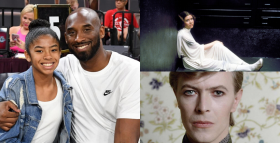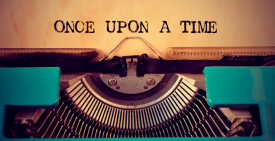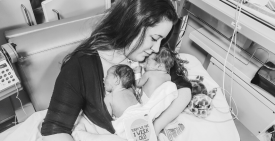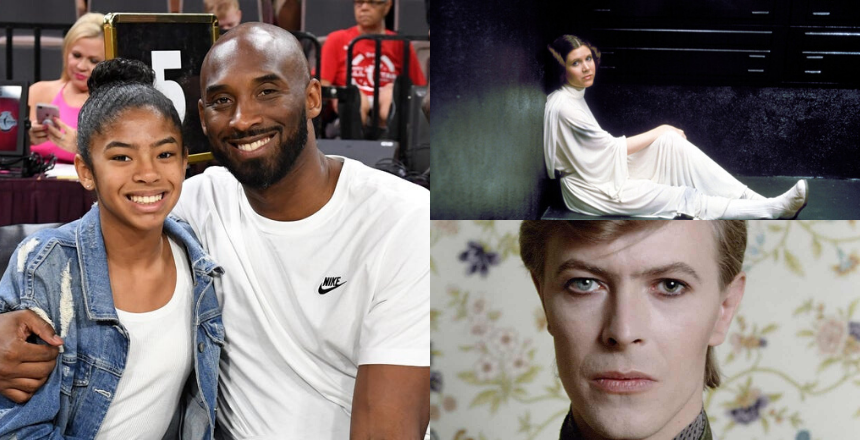
Clockwise from left: Gigi and Kobe Bryant, Carrie Fisher, David Bowie
For the rest of my life I’ll remember where I was when I learned about the sudden, violent deaths of Kobe Bryant; his daughter, Gigi; and seven other people on Sunday (sitting on my sofa, about to wake my toddler up from his nap).
I also remember where I was when I heard David Bowie died (weirdly, listening to “The Man Who Sold the World” while writing a piece in Austin, Texas). And Carrie Fisher’s (cleaning up my living room after a holiday gathering, feeling exhausted at eight months pregnant), and, heck, even Freddy Mercury’s (in homeroom at Lower Merion High School, waiting to recite the Pledge of Allegiance).
Each death sent me reeling in different ways, and for different lengths of time. Why? Because even though we don’t personally know public figures (though, in full disclosure, Kobe and I went to Lower Merion together), it all feels so very personal. It’s a realization that every single loss in our lives is an individual experience worth examining and honoring. And, like most things in life, it’s complicated.
I spoke with a few grief counselors around the country to help to make sense of the overwhelming, and sometimes surprising, grief we may feel when a celebrity dies. Including taking important steps to care for ourselves and those we love in the aftermath.
1. Back away from the phone.
Is your feed starting to feel overwhelming? Is more coming up for you the more you watch others’ reactions, updates and highlight reels? Are you having trouble focusing on work or dealing with family or other daily responsibilities? Take back some of the power the story holds over you and stay off social media. “It’s so easy to get sucked in with these stories,” says Alysha Lacey, program director at The Dougy Center. “Celebrity loss can be impactful because it connects us to our own mortality and the other losses we’ve had in our lives.” So, put a moratorium on your exposure levels. As tempting as it may be, don’t let yourself watch upsetting videos (including any tributes from sobbing friends and fans), and only check in with reliable news sources. Better yet, remove Facebook and Twitter from your phone. Then reach out to your own support communities – friends who you feel comfortable with, an IRL or online support group, and consider seeking professional help if need be.
Put a moratorium on your exposure levels. As tempting as it may be, don’t let yourself watch upsetting videos and only check in with reliable news sources.
2. All your feelings are ok. Even if they’re diametrically opposed.
Regardless of a celebrity’s Q-Rating, every person is complex and multifaceted. Just because someone’s poster is on your wall doesn’t mean they’re picture perfect. Someone whose work may have inspired you and united millions of people may also have caused deep pain to others that continues to this day. Ergo, your grief over their death is likely to be confusing, conflicted, and not always mirror what you see in the headline tributes.
“Allowing yourself to process the emotions that don’t lend themselves as well to TV or Twitter is the best way to be truthful to the realness of a loss that reminds us that nobody is actually larger than life,” says Dan Wolfson, a New York City-based clinical psychologist specializing in grief, loss and trauma. “It’s important that we allow ourselves the space to reflect on our relationships and feelings about any person who has died with honesty. This includes an acknowledgement not only of their strengths and the reasons we cared for or admired them, but also an acknowledgement that no person is without flaws.”
Feeling despair, confusion, relief, indifference, and feeling all of it at once? It’s ok. Just like it’s ok for someone whose reaction you don’t agree with to have their own set of feelings. (Hint: If you haven’t figured this out yet, it’s really hard to argue someone out of their feelings; especially in grief.)
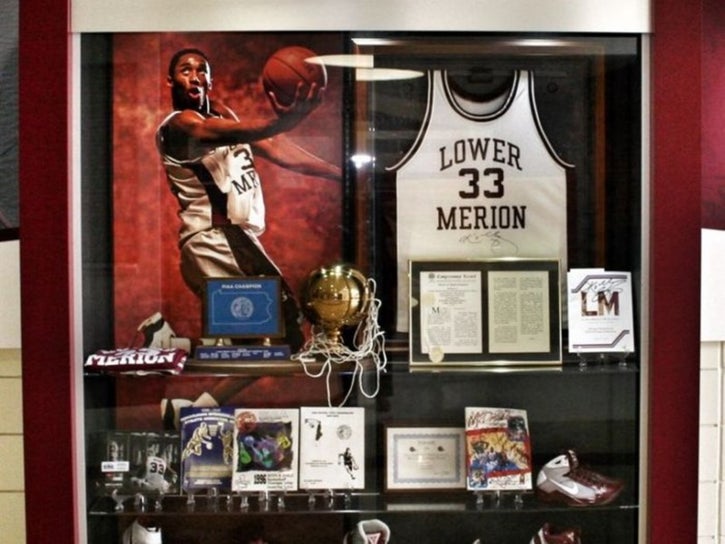
Kobe Bryant memorabilia inside Lower Merion High School
3. Model healthy grieving for kids.
It can be tricky to help children process their feelings about the death of a celebrity they have grown up with and idolized. Even if you don’t personally get the fanaticism, honor whatever feelings they have and make it clear they can share what this person meant to them. Watch their videos, listen to their music, do anything that helps you to understand the connection. Just like with grown-ups, celebrity deaths can bring up past grief or other losses in a very intense way, “especially since it can feel to a child or teen that their celebrity idols really ‘got them’ and that there was a personal connection between the two,” says Szafran.
“Providing honest and age-appropriate answers to children’s questions, identifying what has helped them cope with intense feelings in the past, and reducing exposure to social media stories are all ways we can support the children in our life as they cope with a celebrity death,” says Meghan Szafran, Director of School & Community Services at Philadelphia’s Uplift Center for Grieving Children.
Honesty can also open the door to other important conversations down the line, because your child will know you’re a safe adult and that they can always come to you with questions.
That includes, if they ask specific questions about it, explaining the cause of death – including the uncomfortable ones like drugs or suicide. “Explaining how the person took too much of a medicine or substance that caused their body to stop working is information provided without judgment or blame that the child needs,” says Szafran. Such honesty can also open the door to other important conversations down the line, because your child will know you’re a safe adult and they can always come to with questions.
4. Feeling triggered? Go back to what worked earlier.
A celebrity death can bring up So Very Much. When it does, you might ask yourself why the hell the loss of someone you never met is knocking you for such a loop. And you might be a little embarrassed about having such a strong reaction to someone in the public eye. But public figures — and their deaths — are deeply connected to significant moments and people in our own lives. Is Kobe’s death affecting you because you and your now deceased dad watched every game together? Because you are a bereaved parent yourself? Because you are a rape survivor? Lacey suggests thinking through how you effectively cared for yourself during those times, including any coping mechanisms you learned or healing activities you turned to. Can you rely on those again, or do you need something else? If so, seek professional help.
5. It’s ok to go against the vocal majority.
It might feel unpopular to share your reactions to certain aspects a celebrity’s legacy, but those reactions are healthy. Celebrities have every misstep examined from every angle, judged, and remembered forever by the public. Not to mention any crimes they were charged with, regardless of whether they were found guilty, such as sexual assault, murder, pedophilia, domestic assault, racist or misogynist acts, or other violent crimes. In these cases, a public figure’s death can be extremely polarizing and even isolating. Especially when most of the headlines and people around are looking at them through rose-colored glasses and you’re left wondering if they somehow forgot about the terrible thing they did. “In our support groups we really try to provide space for the other side of the coin,” says Lacey, “because it’s often in the room but the vulnerability to bring it up can be really difficult.” So remember: You are not the only person feeling this way. Her advice? Share your opinion if you’re up for it. You just might inspire others to do the same, and at the very least, you’ll help someone else realize they aren’t alone in their feelings.
Share your opinion if you’re up for it. You just might inspire others to do the same, and at the very least, you’ll help someone else realize they aren’t alone in their feelings.
6. Remember this when you want to get nasty: Celebrities are still human beings.
Most of the deaths that punch us in the gut are the ones from the everyday people in our lives. And because we and others around us knew them so well, we tend to memorialize them in all their positive lights. That’s not always the rule with celebrities. “If there’s an idol-type relationship, people can feel they have more right to bash them in public,” says Lacey. “It’s important to remember they were everyday people who were somehow thrown into the spotlight, and they’re still everyday people to the people around them.” And those people are reading — and sometimes hurting from — public denouncements.
7. The weirdly good news? Your relationship isn’t over.
What creative rituals have you developed to stay connected loved ones who’ve died? Writing them letters, making their favorite foods, participating in activities they liked, watching videos that make you smile, remembering them with others through favorite anecdotes? Well, guess what? You can do the same thing with someone you’ve never even met. “It may seem almost contradictory to continue a connection with a person you did not know personally, but the connection we often feel to celebrities is real and can run very deep for some very personal reasons,” says Meghan Szafran from Uplift. “Identifying ways you can honor the legacy of the person, keep their memory alive in the things you do or what you wear, and sharing memories or stories with other people can be very healing as you walk through this grief.”
Rebecca Soffer is cofounder of Modern Loss.

